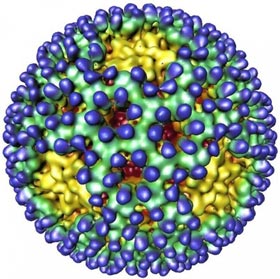
The reovirus family, which includes the human pathogen rotavirus and various livestock pathogens, infects most mammals. Like all viruses, reovirus uses cellular processes to enter host cells and cause infection. The cellular factors that provide reovirus access to the cell interior are not fully defined.
In the April Journal of Virology, Bernardo Mainou and Terence Dermody identify the protein kinase Src as an important mediator of reovirus cell entry. The investigators found that chemical inhibitors of Src kinase diminish reovirus infectivity by blocking an early step in the life cycle of the virus. Reovirus co-localizes with Src during cell entry, and reovirus infection activates Src. They also showed that reducing Src levels limits reovirus infectivity, supporting a role for Src in reovirus cell entry.
Understanding how viruses engage Src and other cellular factors to gain access to the cell interior may foster the development of broadly active antiviral drugs that inhibit key steps in the entry process.
This research was supported by the National Heart, Lung and Blood Institute, the National Institute of Allergy and Infectious Diseases, and the Elizabeth B. Lamb Center for Pediatric Research. Additional support was provided by awards to the Vanderbilt-Ingram Cancer Center from the National Cancer Institute and to the Vanderbilt Diabetes Research and Training Center from the National Institute of Diabetes and Digestive and Kidney Diseases.